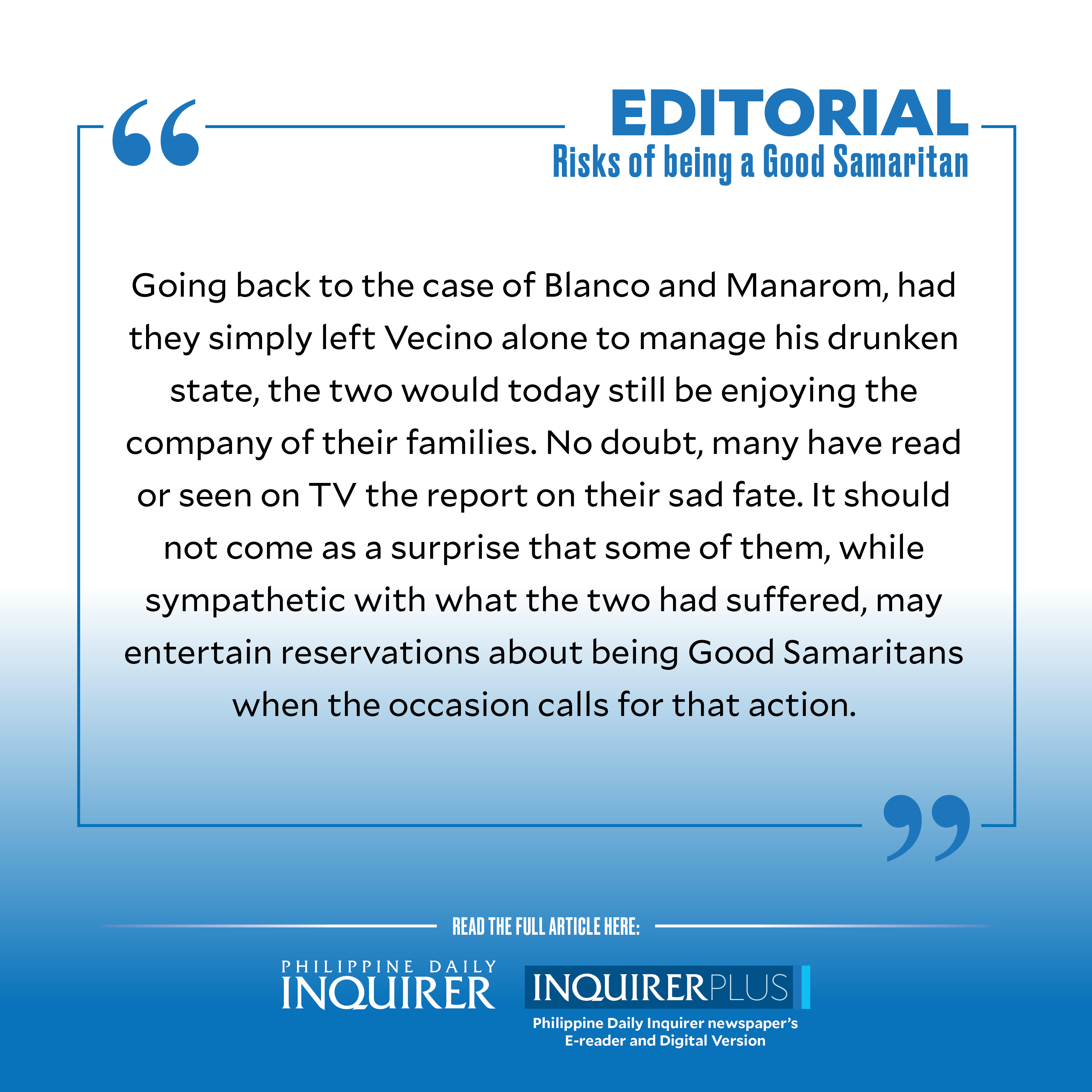Risks of being a Good Samaritan

In an ironic twist of fate, a Good Samaritan lost his life recently in the hands of the person he tried to help.
In the evening of April 28 in Caloocan City, nurse Mark John Blanco, 38, offered to assist Joel Vecino, a security officer, after the latter fell from his motorcycle.
Apparently irked by the failure of his motorcycle to start, Vecino, who was under the influence of liquor, shot Blanco and Willy Manarom, 39, a resident in the area, who tried to pacify him.
Both died on the spot. Vecino tried to escape, but responding police officers were able to arrest him and recover his motorcycle.
Blanco left behind a wife and five young children. There were no reports about Manarom’s bereaved family. Since the bullets recovered from the crime scene appear to have come from Vecino’s gun, his conviction for multiple murder is almost certain.
No doubt, Blanco was driven by a strong sense of duty as a health-care professional when he took it upon himself to help Vecino get back on his feet after he fell from his motorcycle.
You reap what you sow
Blanco could just have ignored Vecino’s accident and proceeded to wherever he planned to go that evening. Something visceral or his prior training must have driven him into stopping and assisting Vecino.
In Manarom’s case, he could have just stood by and done nothing when he saw Vecino shoot Blanco. He did not have to get involved, but perhaps he felt it was his moral obligation to calm Vecino to avoid further bloodshed. Sadly, he paid with his life for doing that.
In the normal course of life, a good deed performed by a person to another without any expectations of rewards often results in something positive to that Good Samaritan.
As the saying goes, you reap what you sow. If a person’s action brings happiness to another, that happiness would eventually find its way to the person who gave it first.
Thus, it’s disheartening to hear of instances when good deeds are adversely reciprocated or, worse, result in death, as in the case of Blanco and Manarom, who only did what they felt was their moral obligation to someone who they felt could use their help.
It is not easy to be a Good Samaritan in our country. While majority of Filipinos are thankful and appreciative of acts of charity, cynicism (or raised eyebrows) sometimes greets such deeds.
Why is he or she doing that? Is his or her action motivated by good intentions or is there something behind it from which he or she expects to benefit from?
Adverse consequences
Being a Good Samaritan in cases that involve vehicular accidents, sudden serious health problems, and third-party conflicts that result in injuries (or death) could give rise to adverse consequences.
For example, if a kindhearted bystander brings to a hospital the victim of a hit-and-run, that rescuer would not be allowed by the hospital’s security personnel to leave the hospital until after he or she has been questioned by the police about the circumstances of the crime.
That Good Samaritan may even be detained by the hospital until he or she pays or makes arrangements for the payment of the victim’s hospital bills.
Worse, he or she may even be held responsible by the police for the injuries suffered by the victim and be charged with serious physical injuries!
Standard operating procedure
The same scenario is replicated in cases of health emergencies and in homicide or physical injury cases when the victims are brought to the hospital by concerned citizens.
The person or persons who performed the act of mercy may find themselves being held responsible for the costs of hospitalization or named as persons of interest (read: suspects).
So why do Good Samaritans sometimes get into trouble for doing Christian acts? Because it is standard operating procedure in hospitals, as required by police regulations, and, most importantly, to make sure the victim’s hospital bills are (hopefully) paid by whoever brought him or her for treatment.
Given those circumstances, hospitals cannot be blamed if on some occasions they make being a Good Samaritan an unenviable act.
Justified indifference
Going back to the case of Blanco and Manarom, had they simply left Vecino alone to manage his drunken state, the two would today still be enjoying the company of their families.
No doubt, many have read or seen on TV the report on their sad fate. It should not come as a surprise that some of them, while sympathetic with what the two had suffered, may entertain reservations about being Good Samaritans when the occasion calls for that action.
But they cannot be faulted if they opt to be onlookers or unconcerned bystanders when they witness accidents or events that require outside assistance.
Their indifference is justified because they know there are risks in being a Good Samaritan in our country.















